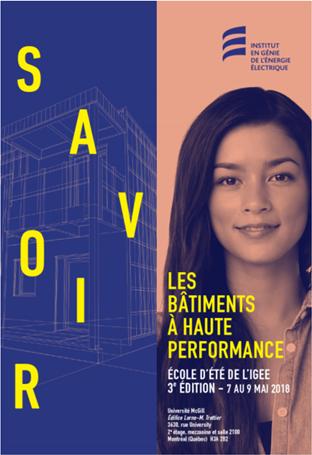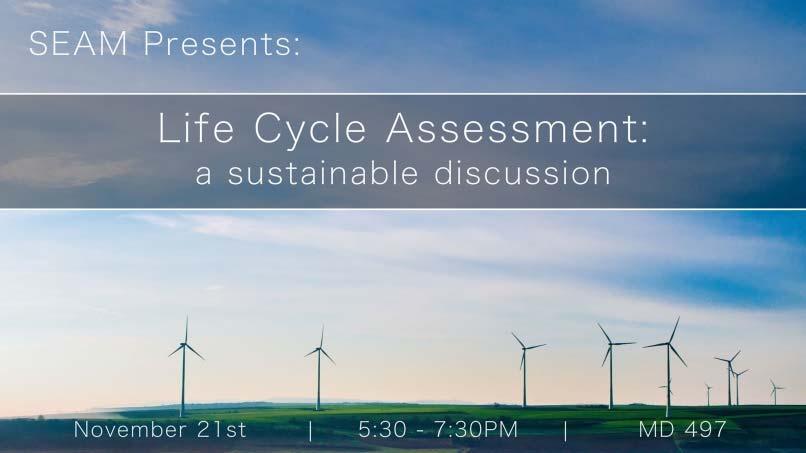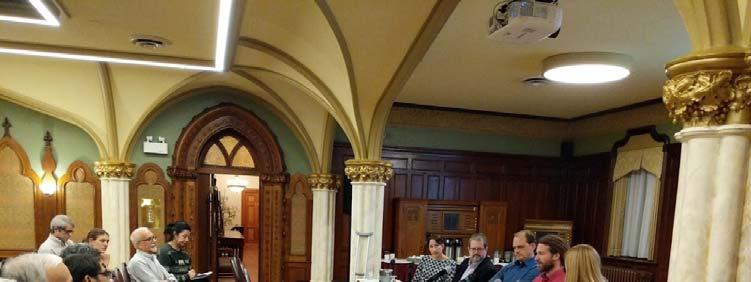
10 minute read
Education and Training
TISED educates future engineers, urban planners, and architects by offering training opportunities, new courses, integrating sustainability into programs, and enhancing education 'outside the classroom'. Teaching focuses on effective, practical, cutting-edge theories and strategies relevant to the development of sustainable engineers, architects, and planners' career paths. TISED offers a growing catalogue of interdisciplinary sustainability-focused courses, and a master’s program in Sustainability in Engineering and Design is under development.
Master’s Program: M.Eng in Sustainability in Engineering and Design TISED is excited to report that substantial progress has be made since the last annual report. The program has passed all the internal review steps at McGill and is almost ready to be submitted to the provincial government for approval. This review of a new degree program has been a long process requiring consultations at numerous stages. Building upon the original business case, the master’s program was first approved by the McGill Faculty of Engineering in May 2018. Over the summer, TISED continued working on building up the internal proposal by obtaining final approval of future courses and setting up the program’s support infrastructure. The program was approved by the Council of Graduate and Postdoctoral Studies (CGPS) in September 2018.
Advertisement
Progress on the program has increased as we get closer to our goal. A new master’s program manager, Gary Ng, was hired in October 2018 to finish the work on the 300plus page proposal to the Government of Quebec. The proposed program and budget were endorsed by the APC Subcommittee on Courses and Teaching Programs (SCTP) in January 2019. In quick succession, the Academic Policy Committee (APC) of the McGill Senate and then the full McGill Senate gave final approval to the sustainability program in February 2019. Now we are working on obtaining physical resources for the program and the final preparation of the document that will be sent out to the Bureau de coopération interuniversitaire (BCI) and to the Québec Ministère de l’éducation et de l’enseignement supérieur. The goal is to deliver the submission to the BCI and the Quebec Government by the end of summer 2019 for review in the fall of 2019.
TISED Course Offerings In 2018-2019, TISED offered four courses to graduate and upper-level undergraduate (U3) students in the Faculty of Engineering. Three of these courses were returning courses: ‘Energy Analysis’, ‘Sustainable Urban Communities’, and ‘Life Cycle-Based Environmental Footprinting’. ‘Climate Change Adaptation and Engineering Infrastructure’, was offered for the first time this year, and more new courses are planned for the upcoming academic year. These courses will eventually become part of the master’s program.
TISED promotes interdisciplinary education through its course offerings, seeking to attract students across academic units. Students from all seven Faculty of Engineering
departments and schools, as well as students from Bioresource Engineering in the Faculty of Science and students from outside McGill, have enrolled in TISED courses.
Energy Analysis “Energy Analysis”, now listed in the McGill course catalog as SEAD 510, was offered again by TISED in Fall 2018, with generous sponsorship from the Fondation 3E to promote energy education and literacy. Professor Jeffrey Bergthorson, TISED Associate Director and Panda Faculty Scholar, taught this course for the third consecutive year and continues to inspire his students again.
Dr. Bergthorson tweaks his course slightly each year to improve the experience for his students. The course lays out the economic and environmental challenges that our society faces due to our rapid consumption of fossil fuels. Students are asked to assess their energy use and environmental footprint and quickly recognize that the challenge to be sustainable is difficult for all. The course provides students with the knowledge and problem-analysis skills to investigate different solutions for primary clean electricity generation, transport, and backup power generation. To identify and assess potential clean energy options, the course covers the key aspects of energy literacy, including fundamental thermodynamics, energy concepts, and various energy metrics. Students critically analyze and discuss traditional and alternative energy and power systems. For their final projects, students assess why their proposed clean energy solutions are, or are not, viable commercial options. The analysis of alternative power systems uses a multidisciplinary and integrated design approach that includes life-cycle and economic analyses. In this course, students develop their ability to think critically, apply rigorous methodology to complex design problems, and supplement technical design with economic analysis.
By the end of the course, students learn about:
Energy: now and in future Energy metrics Alternative Primary Power-Generation Systems Alternative Energy-Storage and Secondary Power-Generation Critical Analysis and Application of Theory
Sustainable Urban Communities “Sustainable Urban Communities” (listed as FACC 511: Selected topics in the Faculty of Engineering) is sponsored by Fondation 3E and was offered by TISED again in Winter 2018. The course is a logical sequel to the “Energy Analysis” course above. It was Professor Michael Jemtrud’s first time teaching the course. Prof. Jemtrud is a TISED member from the School of Architecture.
The course addresses sustainable design theory and applications in the built environment with students from a variety of fields (architecture, urban planning, engineering, sociology, environmental studies, economics, and international studies). Architecture provides the focus for environmental, socio-cultural and economic issues. The course investigates a holistic interpretation of sustainability and resilience by interrogating the
potential of architecture and urban design to affect real change in environmental practice.
By the end of the course, students learned how to: Paraphrase ideas and writing of scholars, scientists, architects, and urbanists in writing synoptic essays of assigned theoretical texts Enact critical thinking skills through discussion, writing, and presentations by acquiring a historical and theoretical foundation of issues addressed in the course Discuss on a knowledgeable level the key issues facing sustainable design practices relative to course context and theoretical framework Engage in cross-disciplinary discourse with colleagues Engage in research-through-design methodologies as a critical mode of inquiry
Life Cycle-Based Environmental Footprinting “Life Cycle-Based Environmental Footprinting” (listed as SEAD 520 was offered by TISED for the second time in Winter 2019 and taught by Anne-Marie Boulay.
Rooted in engineering and looking at the entire life cycle (from cradle to grave), environmental footprints quantify potential environmental impacts associated with the use of a product, process or service. The course covers the concept of footprint and the different types of footprints which have emerged over time, leading to the lifecycle based environmental footprints: carbon footprint, water footprint, and a complete environmental life-cycle analysis (LCA). The course also explores the political applications and implications of the environmental footprints and the related ISO standards. Environmental footprint communication is also covered, including labels, product declaration, and the different rules that apply. Finally, the concept of planetary boundaries and its link with environmental footprints is introduced.
By the end of the course, students learned to: Understand such essential concepts as life cycle, inventory, impact assessment, water footprint, carbon footprint Be able to understand and assess the relevance of environmental information communicated in a paper, label or website Understand the implications that environmental information can have on policies and the directions in which international governance may be going Understand the key concepts associated with sustainable products and manufacturing Reflect on the impacts of his/her decisions as both an engineer and consumer
Climate Change Adaptation and Engineering Infrastructure SEAD 515 is the latest addition to the list of SEAD courses offered by TISED. This course focuses on Climate Change Adaptation and Engineering Infrastructure and is being taught by our Trottier Chair Prof. Laxmi Sushama.
With the growing challenge of climate change faced by everyone around the world, understanding the durability and sustainability of engineering systems and infrastructure
around the world has become of great importance. This course provides an opportunity for students to increase and develop their knowledge about the science of climate change and will learn the importance and effectiveness of global and regional climate models, in the context of supporting engineering systems and infrastructure. Students will also be equipped with the knowledge and tools to evaluate the impact of climate change on engineering systems and infrastructure and design reliable and sustainable adaptation and mitigation solutions.
By the end of the course, students learned to: Understand the fundamentals of the science of climate change and the importance of global and regional climate model predictions. Obtain climate information for engineering applications using various mathematical tools and techniques. Evaluate the impact of climate change on engineering systems and infrastructure using various diagnostics. Apply scientific analysis methods for climate change adaptation and mitigation strategies.
Education highlight: SEDTALKS!
In 2016, TISED launched ‘SEDTalks!’, a platform for student researchers to share their sustainability research, develop professional skills in public-speaking and communication, expand their academic and industrial networks, and work with other researchers to make an impact on sustainability through engineering and design. In the pilot program, three of the student applicants were selected to receive specialized training.
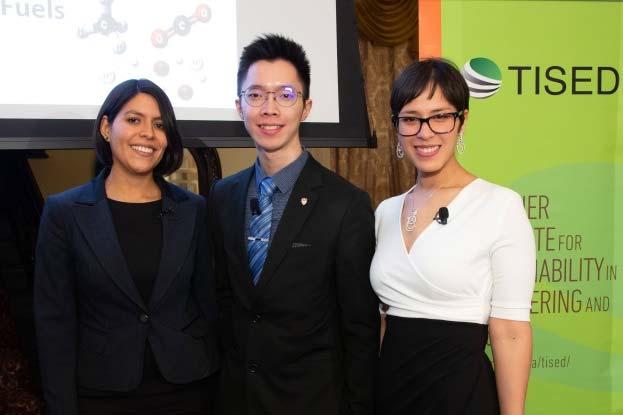
In 2018-2019, we made changes to SEDTalks and increased the number of students benefitting from the program. Fifteen graduate students, all working on sustainability-related research in different disciplines across the Faculty of Engineering, applied to the program and participated in a series of training sessions aimed at improving their research presentation skills. The applicants were then invited to participate in a mock 3-minute thesis competition in front of a Selection Committee panel. The competition required students to present their research in non-technical terms. From these competitors, three were selected by the Committee to move on to the second phase of the SEDTalks program and receive personalized and intensive training. The three selected students, or ‘ChangeMakers’, turned their 3minute thesis competition presentations into 18 minute ‘SEDTalks’.
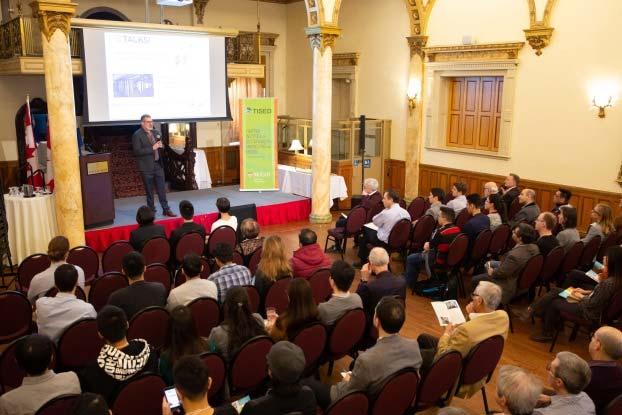
The ChangeMakers worked with trainers, who included professional coaches from Skillsets and TISED Associate Director Jeff Bergthorson, to develop talks that would showcase their great work on sustainability and reach a diverse audience. The program culminated with an event where each ChangeMaker gave an engaging talk about their sustainability-related research to a captivated audience, followed by a networking cocktail. Invited guests included industry professionals, faculty members, students, alumni, and others. Photo Credit: Owen Egan
In addition to training, the ChangeMakers receive in-laboratory portraits, networking materials, and a bursary award.
Meet our 2019 SEDTalks ChangeMakers:
Marianna Uceda PhD candidate in Mining and Materials Engineering Supervised by George P. Demopoulos Sustainable Industrial Processes and Manufacturing
Meeting the Energy Demand: Green Batteries from Start to Finish Lithium-ion batteries, alongside green energy sources, have become an essential part of the green energy solution. They are used to store energy produced during periods of abundance for use during times of reduced production systems. Unfortunately, lithium-ion battery production cannot currently be considered green. Marianna’s research focuses on improving the fabrication processes of lithium-ion batteries to reduce negative environmental impacts during the battery lifetime.
Yee Wei Foong PhD candidate in Mining and Materials Engineering Supervised by Kirk H. Bevan Renewable Energy and Energy Efficiency
Designing Energy Materials: Resolving Ultrafast Dynamics in Materials Simulations New high-performance clean-energy technologies rely on different materials, whose chemical and electrical properties control the resulting performance of the solar panel, fuel cell, or battery. The vast number of possible material combinations makes the prediction of material performance using advanced computational methods a critical component of this effort. Yee Wei’s research explores the development and optimization of ultrafast and high-accuracy material simulation methods that can provide informed predictions to accelerate the design of urgently needed sustainable energy materials
Jennifer Martin del Campo Rodriguez PhD candidate in Chemical Engineering Supervised by Jan Kopyscinski & Sylvian Coulombe Renewable Energy and Energy Efficiency
Upscaling Greenhouse Gases into Clean Fuels: Plasma Reforming of Methane and Carbon Dioxide Carbon dioxide (CO2) and methane (CH4) are two of the most significant greenhouse gases emitted whose environmental impact can be reduced, in order to combat climate change, if they are used as raw materials for industrial processes instead of being omitted into the atmosphere. Jennifer’s research is focused on developing new plasmacatalytic reactors that can upcycle CO2 and CH4 into syngas. The resulting natural is a feedstock chemical, which can subsequently be upgraded into synthetic natural gas, chemicals, and plastics for diverse applications.


